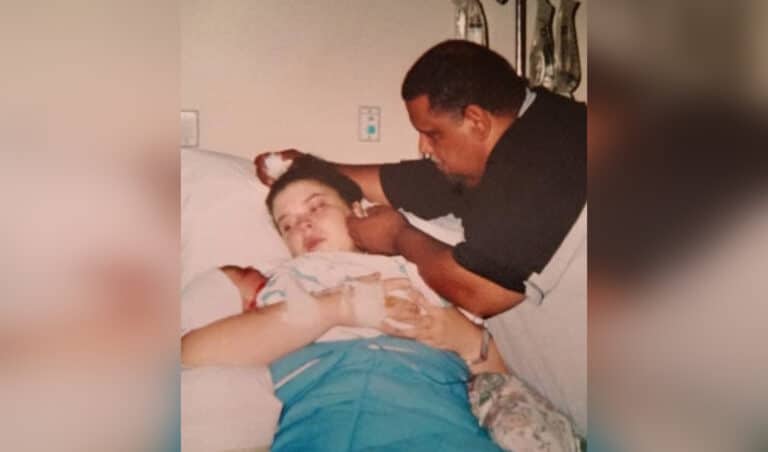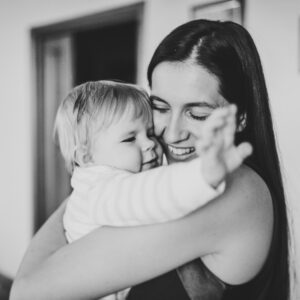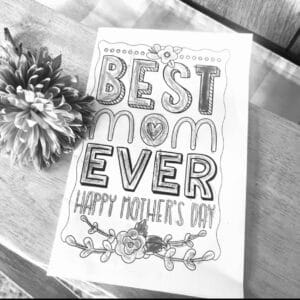October was child loss awareness month. I realize this each year when I start seeing posts about it on social media. I never pay too much attention to it because I am aware of child loss every month, day, and hour. I think my family and friends are, too. My daughter died over five years ago, and not a day goes by when I don’t think about her absence.
Earlier this month, I was slouched back in an armchair in a little nook in our family room while my boys watched the Paw Patrol movie for maybe the 100th time on TV. I was mindlessly scrolling through social media, you know, like I do sometimes without realizing it. Then, I came across a photo of a four-leaf clover with a quote:
“If you simply can’t understand why someone is grieving so much, for so long, then consider yourself fortunate that you do not understand.”
Yes! I thought as I sat up straighter in my chair, getting ready to type a post to share on my feed. I paused. Wait a minute, I thought. Then I asked myself a series of questions.
Has anyone ever said to me that they don’t understand my grief?
No. In fact, it’s the opposite. Most people tell me things like, “I don’t know how you do it.” Which truthfully, neither do I some days.
RELATED: Grief is a Constant Companion for the Mother Who’s Lost a Child
Has anyone ever asked me why I am still grieving June? No, not exactly. I have had a couple of people push me toward focusing more energy on my two boys, but no one has blatantly asked me this question.
If none of these answers are yes, then why is this quote resonating with me? Why did it stop me in my mindless-scrolling tracks to immediately spin into action? I don’t know.
This was a question I couldn’t answer right away, but it felt important for me to consider. If not for this post, just for my own curiosity. So I put my phone down, got up from the chair, and started to get busy with something else. I began to unload the dishwasher, wondering, in the back of my mind, why I felt so strongly about the quote.
As I thought about it more, I realized that I have become my greatest invalidator of my own grief.
As the years go by, I am my biggest critic here. But when I negate my grief and the fact I still feel it so enormously—some days stronger than I did five years ago—my mind plays tricks on me.
This nagging internal voice is sneaky, though, because I imagine this criticism coming from other people. As I go for a walk, for example, and I start feeling sad about June and how I wish it had all played out differently, I imagine if I were to share this with people, they would tell me they are tired of hearing about June and that I shouldn’t be this sad anymore.
After I post a picture of June smiling with a sentimental quote, for instance, I imagine people reading it and thinking to themselves, It’s time to move on, Genny. Additionally, my inner critic can double down when people may not like the post of June, and I make a leap that people want me to get over it already.
While these negative thoughts may be true, it also may be true that people may not know what to say if I bring up June and don’t want to say the wrong thing. People may not have liked a post because they didn’t see it or that they saw it and read it but didn’t like it because they forgot.
The point is I have no idea what anyone thinks unless they tell me.
And that is probably a good thing, don’t you agree? Would we want others to know every little thought that goes through our heads? I know I wouldn’t. I don’t even agree with all the things that pop into my head.
I’ve learned that anytime I use the word people in the generic sense, I need to examine my thoughts and clarify who those people are to me. I may narrow down a list of who I think they are, but even in those cases, I begin to see I don’t have evidence that my assumption is true. When I pursued my master’s degree in counseling, I learned about projecting our feelings onto others. It is a defense mechanism I became curious about, probably because I noticed it in myself and my relationships. This concept became something I wanted to work on, and I still do.
We engage in projection when we take our feelings about ourselves and attribute them to others, particularly feelings with which we are uncomfortable.
For example, it’s a lot easier to be angry at someone else than at ourselves. And if it’s actually my inner critic that is in the wrong, it’s definitely harder to validate myself against myself. So I naturally want to turn to others to affirm my pain (maybe through a social media post?) because somewhere along the road, I told myself that others’ opinions weigh more than my own.
RELATED: To the Moms and Dads Who Suffer Loss: You Are Not Alone
But I have to continue to look inward; otherwise, that voice will get louder. I will keep putting myself down, and my relationships will suffer if I put my insecurities on other people.
I realize I am lucky—no one in my life has made me feel wrong about making June such a big presence in my life. But, unfortunately, I have heard stories from friends where their loved ones invalidate their grief and want them to move on. And for that, I say shout this quote from the rooftops.
But maybe there are some other parents out there like me?
Perhaps it’s time to shut down that inner critic that is uncomfortable with your own grief and is belittling you for feeling it every day? Maybe we need to give her a name and tell her to shut up every now and again. Then, we can post some of these quotes on our mirror that remind us that our pain still matters. That’s what I am going to try to do anyway. And, it’s always good to talk to a friend who understands.
Once we are comfortable in all of our emotions—good, hard, and ugly—we can find peace in the fact that we will always grieve our loved one no matter how uncomfortable it is. And that’s the way it should be. I’ve found the more comfortable I am in my own grief, others follow suit. When we give ourselves permission to continuously grieve, we give others that too, and it’s a beautiful gift. After all, grief is just an expression of love, and love never dies. So we all had better get used to it, especially my inner critic.
Originally published on the author’s blog

If you liked this, you'll love our book, SO GOD MADE A MOTHER available now!
Order NowCheck out our new Keepsake Companion Journal that pairs with our So God Made a Mother book!
Order Now
















